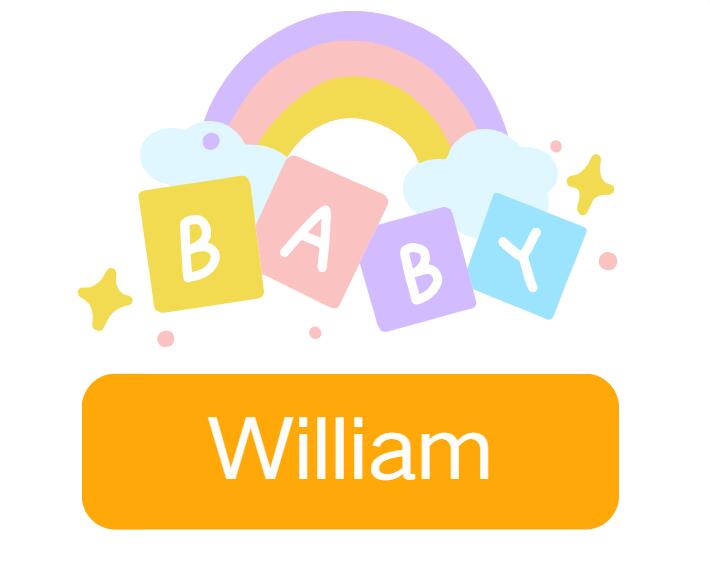Choosing a name for your baby boy is an exciting and important task. Among the many timeless options, William stands out for its strong historical roots and enduring appeal. This article delves into the meaning, origin, and popularity of the name William, providing you with comprehensive insights to help you make an informed decision.

Meaning of the Name William
The name William is of Germanic origin, derived from the Old High German name "Willahelm." It is composed of two elements: "wil," meaning "will" or "desire," and "helm," meaning "helmet" or "protection." Therefore, William can be interpreted to mean "resolute protector" or "strong-willed warrior." This powerful and noble meaning has contributed to the name's lasting popularity.
Origin of the Name William
William has a rich historical background and a prominent place in many cultures. The name was introduced to England by the Normans during the Norman Conquest of 1066, most notably by William the Conqueror, the first Norman King of England. Since then, it has been a favored name among English royalty and commoners alike.
Over the centuries, William has been borne by numerous kings, leaders, and influential figures across Europe and beyond. Its widespread usage in various forms across different languages and regions underscores its universal appeal and timeless nature.
Popularity of the Name William
William has consistently been one of the most popular names for boys in many English-speaking countries. According to the Social Security Administration, William has remained in the top 20 baby names for boys in the United States for over a century. It frequently appears in the top 10 and has a classic charm that appeals to many parents.
The name's enduring popularity can be attributed to its strong, regal connotations, as well as its versatility and timeless appeal. Celebrities, historical figures, and fictional characters named William have all contributed to its sustained popularity and recognition.
Variations and Nicknames
While William is a distinguished name on its own, there are several variations and nicknames that parents might consider. Some popular variations include:
- Wilhelm (German)
- Guillaume (French)
- Guillermo (Spanish)
- Guglielmo (Italian)
Common nicknames for William include:
- Will
- Bill
- Billy
- Liam
- Willie
These variations and nicknames offer flexibility and personalization, allowing parents to choose a form of the name that best fits their preferences and cultural background.
Cultural References and Associations
William is a name with significant cultural and historical associations. In addition to its royal connections, the name has been borne by numerous notable individuals in various fields. Some prominent figures include:
William Shakespeare: The iconic English playwright and poet, often regarded as the greatest writer in the English language.
William Wordsworth: A major English Romantic poet known for his profound influence on literature.
William Faulkner: An American writer and Nobel Prize laureate, famous for his contributions to Southern literature.
In popular culture, the name William has appeared in various films, books, and television shows, further embedding it in contemporary consciousness. Characters named William often embody qualities of strength, intelligence, and leadership, enhancing the name's positive associations.
Choosing William for Your Baby Boy
Choosing the name William for your baby boy means selecting a name with a rich historical legacy and timeless appeal. It is a name that reflects strength, resilience, and nobility, making it a beautiful and meaningful choice.
When deciding on a name, consider the significance it holds and how it resonates with you personally. William offers a blend of tradition and modernity, making it a versatile and enduring choice for a baby boy.
In conclusion, William is more than just a name; it is a symbol of strength, protection, and historical depth. Its Germanic origins and powerful meanings make it a standout choice for parents seeking a name that offers both historical significance and contemporary charm.






